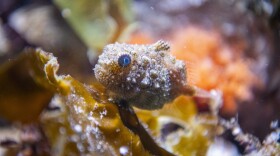Widespread concerns that Canadian officials are silencing scientists have not been assuaged by a detailed government response to the accusations. The battle over “muzzling” Canadian scientists has been broiling for months after it was revealed that a virus deadly to salmon might have been discovered in salmon returning to the Fraser River.
The January response crafted by the Canadian government and submitted to the Cohen Commission after three days of hearings in December absolved officials for not reporting “suspected detection” of Infectious Salmon Anemia, or ISA, in waters off the Pacific Northwest.
Since the positive ISA test results' root causes remain unknown, officials were not obligated to publicize the results, the government asserted.
Center of the storm
Whether ISA is present in Pacific salmon and what – if any – role the virus played in the decline of sockeye salmon in the Fraser River run has become a topic of considerable debate in British Columbia.
Dr. Kristi Miller, a scientist for Canada's Department of Fisheries and Ocean (DFO) who testified in December to finding evidence of ISA in salmon samples dating back to 1986, became embroiled in controversy last summer. Press reports suggested government officials muzzled her ahead of an earlier appearance before the commission.
Though officials asked her to save any public remarks for the inquiry, which concerned another salmon virus linked to cancer in the fish, she was not barred from publishing her findings, Miller told the commission at the time.
However, Miller accused the government of pressuring her to stop investigating ISA during her December testimony, telling the commission she worried officials might remove samples from her lab.
Unavailable for comment
Miller's is perhaps the most widely known case of what journalists and scientists point to as a recent government trend of making scientists unavailable to the press and public. As researchers descended upon Vancouver for the annual American Association for the Advancement of Science meeting in mid-February, the BBC reported on the scientific community's concerns:
“The Prime Minister [Stephen Harper] is keen to keep control of the message, I think to ensure that the government won't be embarrassed by scientific findings of its scientists that run counter to sound environmental stewardship," professor Thomas Pedersen of the University of Victoria told the BBC.
A spokesperson with Miller's superiors told a BBC reporter that relaying scientific findings to the public remained a priority. However, the department refused requests for an interview with DFO scientists.
Cantwell weighs in
U.S. Officials have also shared their displeasure with their Canadian counterparts after learning of the possible ISA detection in the Pacific nearly a decade ago. The virus poses no threat to humans, but is deadly to salmon and thought responsible for mass deaths in the Atlantic.
Sen. Maria Cantwell, D-Wash., called for closer cooperation between Canadian and U.S. officials after revelations of the decade-old research coincided with Canadian university scientists finding ISA in two juvenile Pacific salmon in October. She reiterated calls for closer efforts between the two nations in a statement released today.
"I am very concerned about the impact a salmon virus outbreak could have on fishing jobs and Washington’s coastal economy," Cantwell said. "We need to be ready with a salmon virus response plan which should include boosting our own testing capability. The United States and Canada should work together to protect the thousands of Pacific Northwest jobs that rely on healthy salmon."
Government stands by decisions
As far as the government is concerned, officials acted appropriately in the absence of concrete evidence of ISA in wild Pacific salmon or B.C waters. Even if a form of ISA is confirmed in Pacific salmon, it may be a harmless variant present for decades. More research is needed, according to the government report.
“[T]he tests of samples show mixed results leading all scientists to say that something may have been detected and further research and inquiry is necessary to determine whether anything is truly being detected, if so, what it is and whether it is virulent,” the government's response reads.
Officials are working with stakeholders to draft a plan to further study the possible presence of ISA, as well as similar and related viruses, in the Pacific. They hope to have a final proposal, which likely will call for the testing of 8,000 fish in two years, in place by late spring.
Editor's note: In an earlier version of this story, the Canadian government's response was incorrectly attributed to the Cohen Commission. The commission has not made a final ruling. Its ruling is due to the Canadian Prime Minister by June 30.
On the Web:






